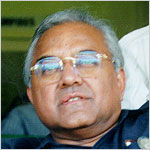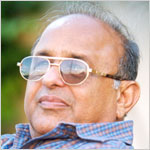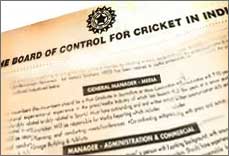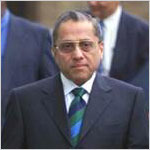What happened to the 'Vision Statement'?
Faisal Shariff
Time flies. One hundred days have flown since the day BCCI president Dr A C Muthiah and secretary Jaywant Lele handed over to then Sports Minister Sukhdev Singh Dhindsa the grandiosely titled 'Vision Statement'.
 Remember that document? It was, when you come to think of it, strange that the board had to be coerced into coming up with a vision for the game it supposedly administers.
Remember that document? It was, when you come to think of it, strange that the board had to be coerced into coming up with a vision for the game it supposedly administers.
But never mind that. The said statement claimed that the BCCI, as the game's administrator, is "fully aware of the passion cricket supporters hold for the great game" and "the interest they have evinced in cricket issues", and promised that it would "strive to protect the values of the game".
There was more such blah -- about the need to "ensure that India cricket is well equipped to meet the challenges of the new millennium" and to "provide direction and vision for all aspects of Indian cricket".
How was the board going to achieve all this, given its signal failure until then? That's an easy one -- the BCCI planned to become a professional organisation.
The very next week, by way of showing us all that it meant business this time, the BCCI ran advertisements in various national dailies, calling for candidates for a wide variety of posts, including a General Manager (Media) to "co-ordinate with press and outside agencies, plan and conduct meets/conferences and also be involved in image building and publicity".
The board also called for candidates for the post of Manager Administration, Manager Commercial, Executive (Umpiring), Cricket Analyst, and executives for international and domestic cricket.
The board, having spent over Rs 11 lakh on inserting these advertisements, also hired Human Resources Consultants India Pvt. Ltd., a Chennai-based company, to screen the responses and pick the right professionals.
How do we know all this? Simple -- the board issued press releases telling us of the ads, of the intent behind the ads, and how the board hoped, within weeks if not days, to finish the process of recruiting, and installing a brand new, professional, efficient administration.
We thought that the tide had finally turned.
One hundred days later, none of the above has happened.
 "We are not taking anybody right now," Jaywant Lele, honorary secretary, told me on the phone when I asked him about the status of the recruitment drive. "We thought about it, and we decided that we will do it later. As of now, we have stopped accepting applications as well."
"We are not taking anybody right now," Jaywant Lele, honorary secretary, told me on the phone when I asked him about the status of the recruitment drive. "We thought about it, and we decided that we will do it later. As of now, we have stopped accepting applications as well."
Could you, I insisted, give me a reason why a project announced with such fanfare has since been shoved on the back burner? There is, Lele replied, no specific reason. "We thought about it and decided that it was not the most important thing on our agenda just now," was his answer.
I then put through a call to the office of the BCCI president. And got, in response, a canned answer: "At an appropriate time, the BCCI will appoint a media-manager. We are looking out for a man who could be able to deliver better goods."
Does that sound like a comment made by a housewife about the poor quality of the neighbourhood greengrocer's services?
Does it strike you that yet again, the board secretary says one thing, the president another? And that neither gentleman seems aware of what the other is up to?
Then again, why should that surprise us? The other day, when our colleague, Onkar Singh, asked Muthiah what he thought of Lele's statement that there is no match-fixing, despite the CBI report, Muthiah's answer said it all: "This is a serious issue, let's leave Lele out of it."
By all means, let's leave Lele out of this -- this is no time for jokes. But seriously, what is inappropriate about this particular time? Why does the appointment of professionals have to wait for an "appropriate time"? And what, come to think of it, IS an "appropriate time"?
 There are a lot of unanswered questions. There is, however, no point in asking them. Because, you see, the board, at this point in time, is in no position to act -- there are two factions, pulling in two different directions. And as happens at times in a tug-of-war, the rope stays stationary, moving neither this way nor that.
There are a lot of unanswered questions. There is, however, no point in asking them. Because, you see, the board, at this point in time, is in no position to act -- there are two factions, pulling in two different directions. And as happens at times in a tug-of-war, the rope stays stationary, moving neither this way nor that.
A very senior board official, speaking to us off-record (which generally means, 'These are the facts but for god's sake, don't tell anyone who told you, or I'll be in trouble'), was the one who tipped us off to the real nature of the problem.
It appears that Muthiah wants a media manager, and assorted other professionals, appointed as soon as possible, if not sooner.
But tugging at the rope from the other end, is the group comprising Jagmohan Dalmiya, Purushottam Rungta and Jaywant Lele -- who are equally determined to ensure that the status quo is maintained, and no new appointments are made.
Why? What do the above mentioned officials have against professionalism? The answer is simple, when you look at it: Professionals will not sit by while games are being played behind the scenes. Professionals might spot the various skulduggeries, and leak inconvenient details to the media. Professionals will not be able to live with the ad hoc style of functioning that prevails today, and which suits the power brokers behind the scenes.
Mind you, it is not just the media that is clamouring for professionalism. Recently, senior players requested the board to appoint a permanent, or at least long-term, administrative manager. The players pointed out the unwisdom of appointing a manager for a seven-day series in Sharjah, another one for a one-off Test in Bangladesh, yet another for the home series against Zimbabwe, and so on.
Again, that has been brushed aside. Or, to use the board's favourite phrase, 'It will be discussed and decided upon at the appropriate time.'
In other words, we can forget about a permanent manager. Why? Because to appoint one takes away a little crumb that the people in power use to mollify their various supporters in various zones. As the situation stands, they can dole out these 'managerial' appointments to their various sycophants, and keep their power base intact. Once a permanent manager takes office, that particular prerogative will not exist any more -- which explains why the board is in no mood to finalise the appointment.
And meanwhile, the board's chief, at least on paper, and the real chief, though not on paper, continue with a tug of war that paralyses the administration.
 When Dhindsa summoned the board officials to a meeting in the aftermath of the Tehelka tapes, it was Dalmiya and Lele who strenuously resisted a CBI inquiry, on the grounds that the BCCI was autonomous, and Muthiah who supported it.
When Dhindsa summoned the board officials to a meeting in the aftermath of the Tehelka tapes, it was Dalmiya and Lele who strenuously resisted a CBI inquiry, on the grounds that the BCCI was autonomous, and Muthiah who supported it.
When the CBI report was released and the head honchos within the board debated what action to take next, it was Muthiah who argued a case for the immediate suspension of the five players named, and the Dalmiya-Lele axis that argued against any such action.
Even the president's move to ban the players was resisted by Dalmiya and K Rungta, but now that the CBI's reports are confirmed, his stand has been vindicated.
The stand-off on the issue of hiring professionals is yet another example of this situation, where one person heads the board on paper, while another calls the shots in fact. We are meanwhile informed that the board has called for a special AGM on November 28, in Calcutta, to 'discuss various issues'.
In passing, do you remember the time when Jagmohan Dalmiya took office as ICC chairman. Arguing that he was based in Calcutta, a branch office of the ICC was set up there, and Dalmiya, as chairman, functioned from Calcutta.
Strange, then, that an important, even crucial, special meeting of the board is convened in Calcutta. The headquarters of the board is in Bombay, and its president is based in Chennai.
So, why Calcutta? You can ask. But you will not get answers. Because, you see, the board is like that only.
Related Links:
BCCI's 'Vision statement'
Our Analysis of the 'Vision Statement'
Our own Vision Statement
Mail Cricket Editor